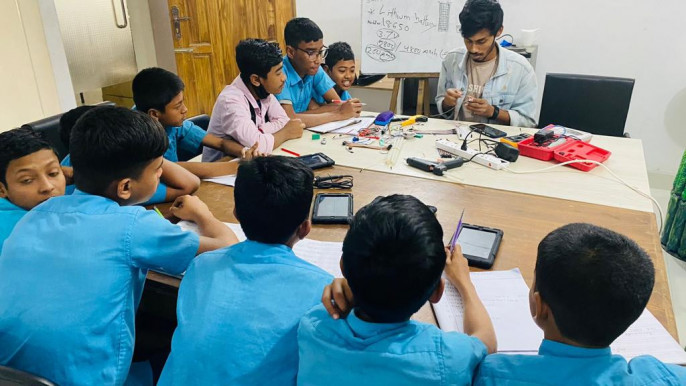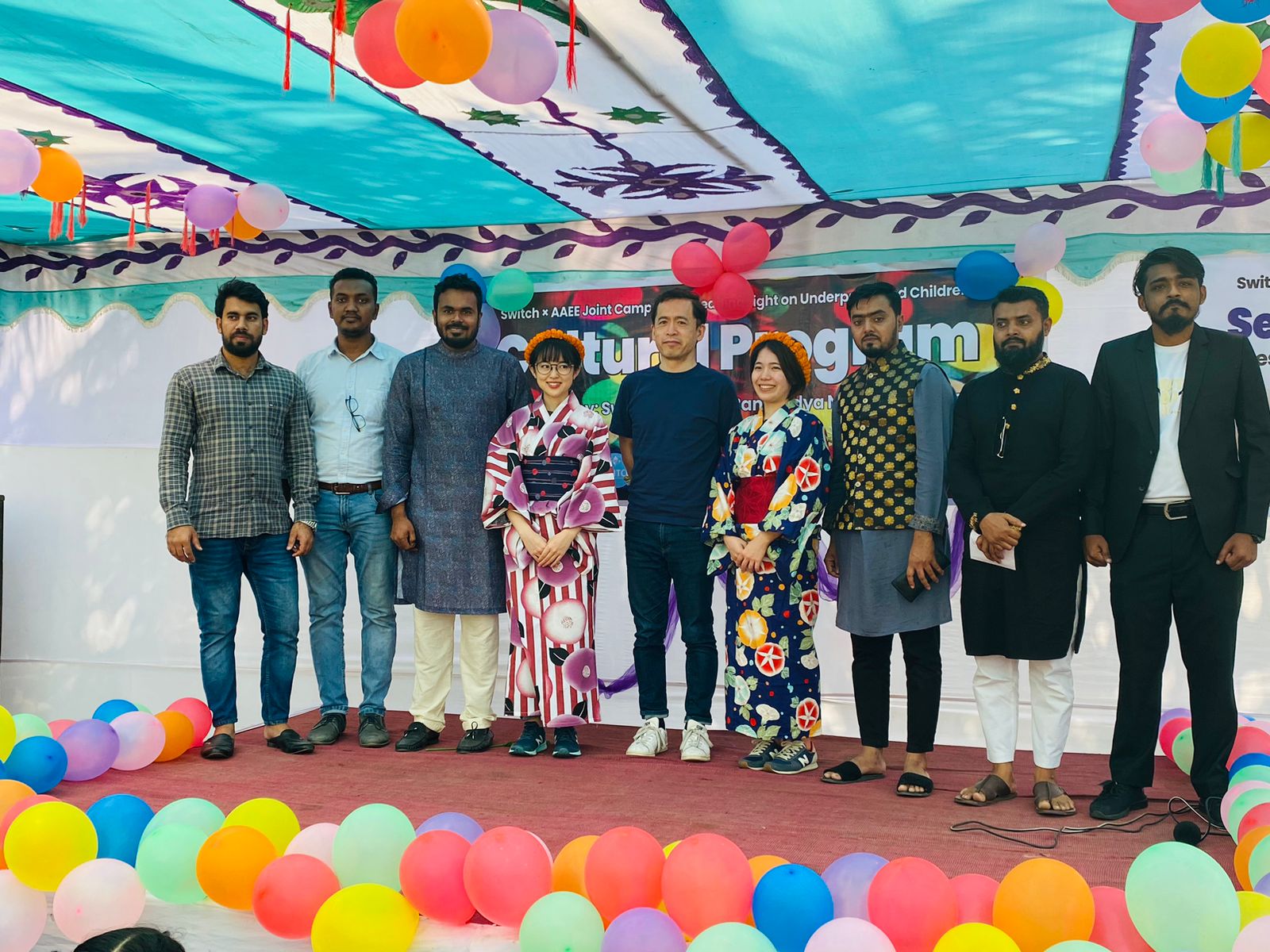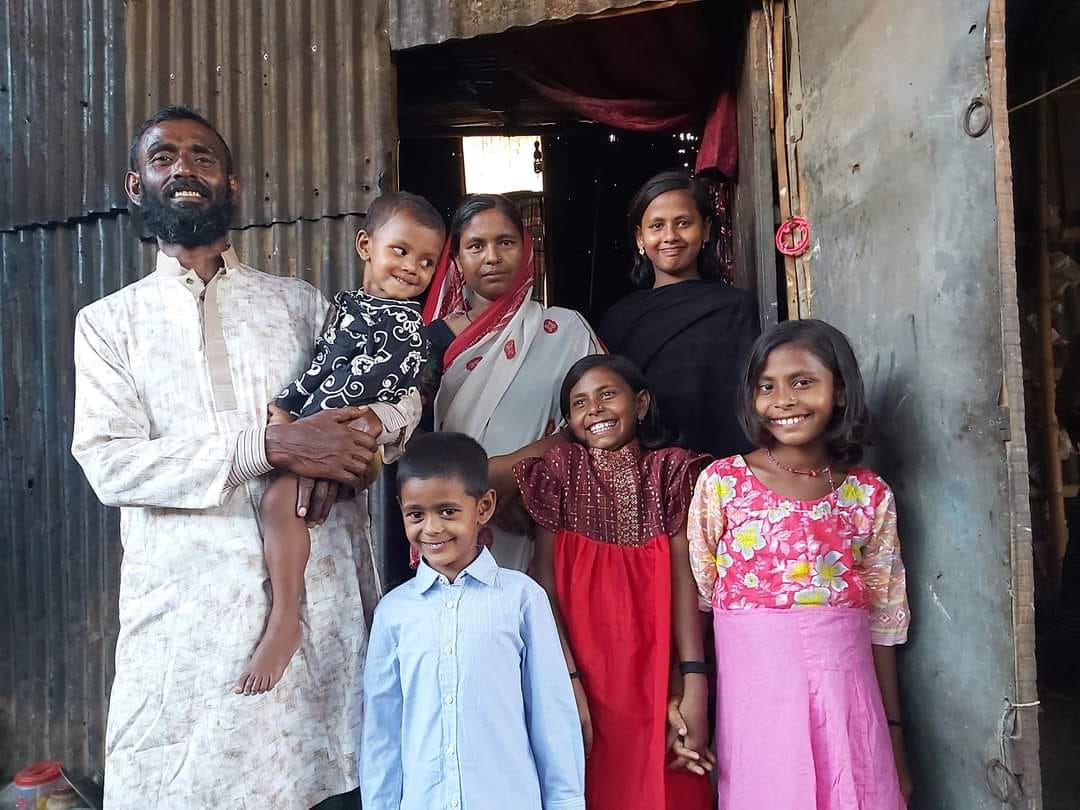In January 2016, a school project began with 47 street children. It has grown to 415 students and astonishing achievements based on a unique, successful teaching model
We took a bus from New Market to Mohammadpur Bus Stand. From there we had to take a rickshaw to Dhaka Uddyan and a quick stroll to Monir Mia’s bagan bari (garden house). At last, we found the desired school, ‘Switch Bidya Niketan.’
This is not typically how other schools operate. The school has neither a playground nor a separate building. The half-built building that houses the school has two levels.
Inside the school, things change. Every room is decorated. The walls are covered in art prints. All of the vibrant paintings look like the work of competent hands. Tokens of accomplishment can be seen everywhere. The showcase is filled with crests and prizes from many competitions.
Students at the school are also not ordinary. They were raised on the streets and in the city’s slums. Some of them have no relatives and no place to live. But looking at them, one would not guess an impoverished background. Their astonishing achievements have now become part of their identity.
How it all started
The journey of this diverse school began in 2016 by Muinul Faisal, a 32-year-old young enthusiast. Born in the Jhalkathi district of Barishal, Faisal was a student at Dhaka University when he became immersed in social services.
From winter clothing distribution to the poor, cleanliness programmes, wheelchair service for the disabled at book fairs and literacy programmes for the illiterate – Muniul did it all.
It was in 2015 in Mohammadpur, when he encountered several street children during a winter clothes donation drive. For the children, education was a luxury. There were no affordable schools nearby, and this stuck.
How to get these children to school kept Muinul up at night. Soon Muinul started to work with a few of his friends to change the fate of street children. However, with time, many drifted away from Muinul’s cause. In the end, Bayzid, Mostafiz and Shah Alam remained comrades.
Morale was high yet limited finances became a hindrance. The team began selling pens to raise funds for the educational programme. After watching this endeavour, a Dhaka University alumni and a former Incepta Pharmaceuticals director Dr. Kamrul Ahsan came forward and assisted.
Additionally, to establish the school, Muinul started asking door-to-door for cash assistance from influential, wealthy social service providers. Eventually, Muinul and his colleagues rented a tiny property with their own money in 2015. For that house, they had to pay Tk 20,000 in advance and Tk 5,000 every month.
It was in January 2016, that the project began with 47 pupils. After witnessing how the schoolchildren excelled in their activities, funds began to flow in from many sources.
The school currently has two branches. ‘Switch Bidyaniketan’ and ‘Switch Tahmina Banu Bidyaniketan.’ The latter was named after the philanthropist who donated 8 katha of land for the school.
The total number of students now enrolled in the two institutions is 415.
Why the name ‘Switch’?
“We all want to improve our condition. To progress from one position to a better one. The name switch comes from the idea of switching from one of these positions to a better position,” Muinul explained.
Muinul always wanted to design a school that was distinct from other schools anchored on practical knowledge.
Because of the unique, hands-on approach to teaching, the schoolchildren became self-assured and eager to learn. They sing, discover, excel in sports and achieve national recognition winning awards in science fairs or sports competitions.
And not just that, these children earn on their own. They sell their handcrafted items – in many cases, enough to cover the family’s expenses. Additionally, the school provides loans to help the family become self-sufficient.
This loan is granted to the parents of minor students. Mothers receive tailoring instruction and work to produce school uniforms, patterned clothing, blankets and backpacks, among other things. They are compensated for their efforts. This arrangement is intended to assist students who marry at an early age or drop out to support their families.
Students build robots, learn coding, art-craft and more
This school’s students are distinctive in their classwork. Children in the fifth, sixth and seventh grades build automatic garbage cans, robots, etc. There’s a trove of extracurricular activities too from painting, fabric and garment work to a wide range of sports. Some have achieved national chess rankings. In this school, students aspire to be world-renowned scientists or athletes.
More importantly, there is one observing teacher for every four students. They concentrate on a student’s interests and strengths. The students are then encouraged to pursue their interests. Some excel at chess while others draw beautiful pictures or learn Python
coding or video editing.
Their excellence extends beyond the classroom, evidenced by triumphs in the ‘Agami Education Foundation’ Olympiads and the ‘Life is Fun’ Science Fair where they clinched both runner-up and champion titles simultaneously. They’ve made waves at the ‘Bangladesh IQ Olympiad’ and showcased prowess in sports, securing commendable positions at national and international chess championships and winning the ‘Pather World Cup’ organised by JCI.
Artistic flair is not overlooked either — students claimed top spots in the ‘Super Kids’ art competition. These are to name only a few examples of excellence.
Yet, the school faces a challenge: every year, around 250 children vie for admission but only 30 can be accommodated due to financial constraints.
Priority is given to the most vulnerable children without parental support, making the selection process stringent beyond just academic exams. It is a space where talent and compassion intertwine, making each achievement more than a medal.
Each student has a sponsor. The school provides books, bags, shoes and uniforms. “Even during the Covid, we provided groceries for their families for three months. And the money spent for each of these works comes from the sponsors,” said the founder.
They learn by ‘learning by doing’ method
The students do not memorise textbooks in class. Rather learn both the theoretical and practical sides of a subject through instruction. For instance, the definition of environmental contamination, its mechanisms and its causes are examined at the field level. Once they’ve seen everything, they write on it. In this process, nearly all students can describe a topic in more detail than an academic book.
For mathematics, the same teaching approach is applied. “We give them some money and send them to the market,” Muinul explained. We figure out how much was spent and how much was returned after making purchases there. They can readily learn maths in this way.” Government school regulations are followed for curriculum and conducting exams.
The students are taught by 17 vested instructors. “It is better to call the salary we give an honorarium. It is foolish to value the hard work they do with money,” Muinul said.
What lies on the horizon?
Muinul’s ambition has grown. He wants to customise his school with a new look. A playground will be built in front of the school. Additionally, the Japanese Embassy recently pledged to support the construction of a two-story facility for this school.
Muinul won the ‘Joy Bangla Youth Award’ in 2022 in recognition of his initiative. He also received the Sheikh Hasina OIC (Organisation of Islamic Cooperation) Youth Capital Award in the same year.
“The happiest feeling is when one of our boys or girls wins an award. I have received the award myself. I don’t feel as good as when they win,” said Muinul.
Muinul’s dream is now to establish a university.






